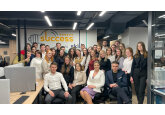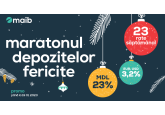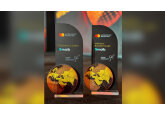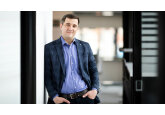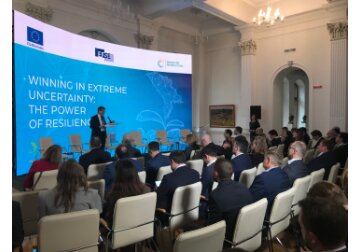
EFSE and GGF host solidarity event to reconfirm commitment to the European Eastern Neighbourhood Region
- Impact investment funds provide local currency financing and technical assistance to financial institutions to build resilient and sustainable businesses
- Over 70 financiers, investors and regulators meet to advance responsible and green financing in the European Eastern Neighbourhood Region
Luxembourg and Chișinău, 24 November 2022 – The European Fund for Southeast Europe (EFSE) and the Green for Growth Fund (GGF) are hosting over 70 participants from central banks, financial institutions, and donor organizations to reaffirm how resilience can be built with local currency finance to support entrepreneurs across Southeast Europe, Eastern Europe, and the Caucasus, and address climate action. The solidarity event, entitled “Winning in Extreme Uncertainty: The Power of Resilience” included representatives from Moldova, Ukraine, Armenia, Georgia and Azerbaijan.
The event comes at a time where countries, still recovering from the economic repercussions of the COVID 19 pandemic, are now dealing with unprecedented economic, social and security instability driven by the military aggression of Russia’s invasion of Ukraine.
To support micro, small and medium enterprises (MSMEs) remain operational and resilient in times of crisis, EFSE and GGF continue to provide financing in local currency to shield entrepreneurs from exchange rate fluctuations. In addition, the impact investment funds are also providing tailored technical assistance to enhance the institutional capacities of financial institutions to drive sustainable business and economic development that encourages job creation and accelerates a green transition across the region.
The event also included a dedicated signing ceremony to confirm the EFSE investment of EUR 20 million equivalent in local currency with OTP Bank for on-lending to MSMEs in Moldova. In addition, a new partnership agreement with Civitta under the “Stand with Ukraine” initiative was signed by both EFSE and GGF to provide capital grants to Greentechs and other businesses to assist them continue to pursue their business operations. This was made possible thanks in large part to contributions made to EFSE by the EU under its “EU4Business” initiative, and contributions made to GGF by the EU under its “EU4Energy” initiative.
Speaking at the event, GGF Chairperson, Christopher Knowles said: “We stand in solidarity with our partners in Ukraine and the larger region and are proud to reaffirm our support together with EFSE. Being able to eliminate currency risk for borrowers through local currency lending helps to boost affordability and improve access to finance - which is critical at times such as these, as we see economies recovering at different rates due to the pandemic and further geopolitical instability. And this in turn makes sure that we continue to progress towards meeting climate goals.”
EFSE Chairperson Klaus Müller said: “As a seasoned expert that understands the needs of micro and small enterprises, EFSE has long provided valuable support and access to capital for the small businesses that form the bedrock of economic prosperity. And during these tough times, we remain committed to building resilience and facilitating economic recovery within the region, by helping businesses adapt in a constantly changing environment.”
Katarína Mathernová, Deputy Director-General for the European Union’s Directorate General for European Neighbourhood Policy and Enlargement Negotiations, said: “The EU is committed to boost the resilience and socio-economic prospects of our partners, in the period of uncertainty we are facing. For over fifteen years now, EFSE and GGF have proven valuable partners, in directing capital where it is needed, to maximize the impact. We very much welcome this collaboration. It has fortified entrepreneurs and the infrastructures that support them, in particular by expanding the ability of local financial actors to serve these businesses, with financing in their own currency.”
About EFSE
An impact investment fund established in 2005, the European Fund for Southeast Europe (EFSE) aims to foster economic development and prosperity in Southeast Europe and the Eastern Neighbourhood Region by investing in the success of micro and small enterprises as well as improved living conditions for private households. As access to financial services is key to developing this segment, EFSE focuses on helping local financial sectors strengthen their ability to provide responsible financing for this target group. Alongside its investment activities through local partners, EFSE multiplies its impact through the EFSE Development Facility, which provides technical assistance, training, and other nonfinancial support to entrepreneurs and institutions.
EFSE was initiated by KfW Development Bank with the financial support of the German Federal Ministry for Economic Cooperation and Development (BMZ) and the European Commission. As the first public-private partnership of its kind, EFSE draws its capital from donor agencies, international financial institutions, and private institutional investors.
Finance in Motion GmbH, Germany, serves as EFSE’s advisor and Hauck & Aufhäuser Fund Services S.A., Luxembourg, acts as manager.
For more information on the European Fund for Southeast Europe, please visit: www.efse.lu
For more information on Finance in Motion, please visit: www.finance-in-motion.com
ABOUT THE GGF
The Green for Growth Fund invests in measures designed to cut energy use and CO2 emissions, and improve resource efficiency in 19 markets across Southeast Europe, the Caucasus, Ukraine, Moldova, the Middle East and North Africa. The fund provides such financing directly to renewable energy projects, corporates and municipalities or indirectly via selected financial institutions. The GGF’s Technical Assistance Facility maximizes the fund’s investment impact through support for capacity building at local financial institutions and partners.
The GGF was initiated as a public-private partnership in December 2009 by Germany’s KfW Development Bank and the European Investment Bank, with financial support from the European Commission, the German Federal Ministry for Economic Cooperation and Development, the European Bank for Reconstruction and Development, and the Austrian Development Bank (OeEB). The fund’s growing investor base comprises donor agencies, international financial institutions and institutional private investors, including the International Finance Corporation, the Dutch development bank FMO, and the German ethical bank GLS. The GGF is advised by Finance in Motion GmbH. MACS Energy & Water GmbH, Frankfurt am Main acts as the technical advisor.
For more information see www.ggf.lu and follow us on Twitter @GreenGrowthFund


